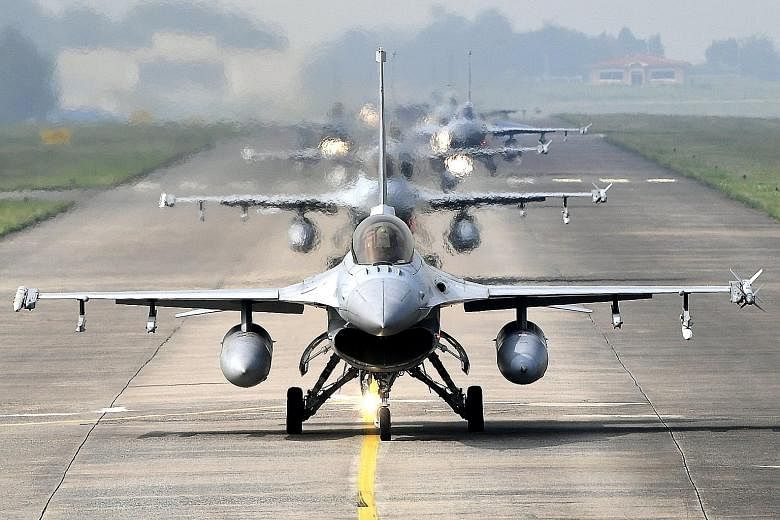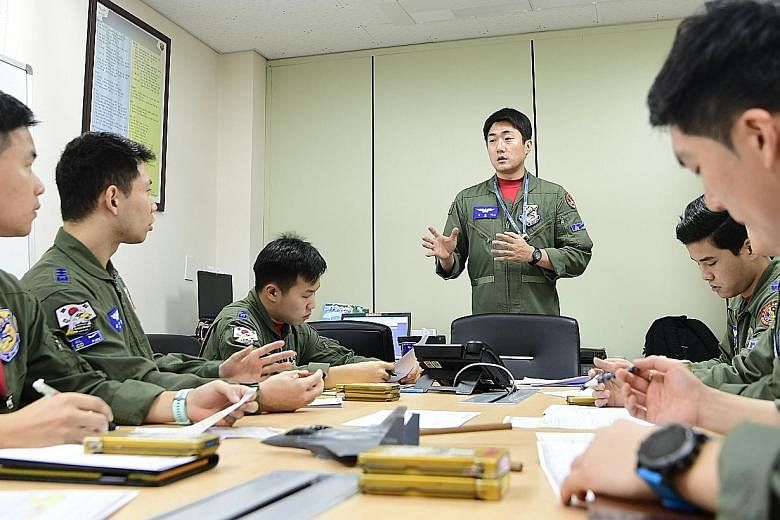SEOUL • South Korea is bracing itself for a possible new intercontinental ballistic missile (ICBM) test by North Korea, when it marks the 69th anniversary of its founding today, just days after its sixth and largest nuclear test.
After South Korean government officials reported signs of another missile test in the works earlier in the week, Prime Minister Lee Nak Yon announced on Thursday that the government expects another ICBM launch today, in defiance of United Nations sanctions and amid a stand-off with the United States.
Last year, North Korea conducted its fifth nuclear test on the Sept 9 anniversary.
And if there is no launch today, another date could be Oct 10, the anniversary of the founding of the ruling Korean Workers' Party.
Even as the North keeps the rest of the world guessing about the timing of its next test, its state media went into attack mode, warning the US that it will "pay dearly" after its ambassador to the UN, Mrs Nikki Haley, called for the strongest sanctions to stop Pyongyang's nuclear weapons programme.
A commentary in the Korean Central News Agency (KCNA) yesterday described Mrs Haley as a "political prostitute" who kicked off a "hysteric fit". The state-run agency threatened the US after Mrs Haley said North Korea's nuclear test on Sunday was evidence that the country was "begging for war". KCNA did not specify the threat.
"Nikki should be careful with her tongue though she might be a blind fool," KCNA said. "The US administration will have to pay a dear price for her tongue-lashing."
-
HOW US SHOULD HANDLE NEW MISSILE LAUNCH
-
White House and Pentagon officials are scrambling to decide how the US should react if North Korea were to launch another intercontinental ballistic missile in the next few days and demonstrate that it can reach Guam, or a distance equivalent to striking the US West Coast. Here's a look at the choices President Donald Trump has, and their downsides.
-
1. A PRE-EMPTIVE STRIKE
President Donald Trump has told friends he is proud of the moment in April when he ordered an airstrike on a base where the Syrian government was believed to have launched chemical weapons attacks. The bombing unfolded during a visit to the US by China's President Xi Jinping, giving Mr Trump the chance to tell him about it during dinner and to send an unspoken message about what might happen in North Korea if it, like Syria, crossed a "red line".
Technologically, it would not be difficult to destroy North Korea's missiles. US warships off the Korean coast could easily hit its launch site, which is near the Sea of Japan. But, unlike the Syrians, the North Koreans know how to strike back - at South Korea, or US bases in Japan.
Still, destroying one missile would do nothing to the North's many others. And it might be hard for the US to prove the missile was truly threatening - without evidence of its target. US officials could argue, though, that the North's leader Kim Jong Un offered an unsubtle hint when he was photographed recently by state-run media examining maps of targets in Guam, including a US air base that houses bombers that can reach North Korea. -
2. SHOOTING DOWN OVER THE PACIFIC
Never has there been a bigger moment for American missile defences - or greater reluctance to use them. In the vision the Pentagon has sold to Congress for decades, the warhead of an adversary's missile could be tracked and destroyed in mid-flight or closer to landing, known as the terminal phase. That is the event for which the US often trains, with decidedly mixed results. If the North Korean missile's target was Guam, or the waters near it, shooting it down would be an iffy proposition. The first shots would be taken, most likely, by destroyers armed with Standard missiles, the most successful anti-missile system in the US arsenal.
But to make it work, the destroyers would have to be in the right place, former senior officials say. A Thaad missile defence system, like the one the US has placed in South Korea, could also be employed. If the missile were headed towards continental US, it could be taken out by one of the anti-missile systems in Alaska and California. In tests, they hit the target about half the time, under perfect conditions. -
3. LET IT HAPPEN
This has been the approach thus far: Track the missile, determine quickly whether it is a threat to a populated area, and let it fall into the sea. That is the most cautious response, and Mr Trump could use it to press China and Russia to drop their objections to more United Nations sanctions.
But it is not cost-free. In each test, the North Koreans get more information to perfect their future launches. And after Mr Trump warned that any threat to the US would be met with "fire and fury", he is acutely aware that making no active response might make it look as if he had ignored his own red line, exactly what he accused his predecessor Barack Obama of doing with Syria. -
4. CYBER ATTACKS
In today's cyber age, perhaps the most tempting solution for presidents is to reach for America's most stealthy weapon. That is what Mr Obama did in 2014, when he ordered an acceleration of cyber attacks aimed at preventing launches.
But there is debate over the effectiveness of that operation and little visible evidence that the cyber attacks, if continuing, are working now. Perhaps the US is waiting for the right moment, but, as one former senior cyber operator said, no target is harder than North Korea. NYTIMES
The US is pushing for a UN Security Council vote on a resolution calling for tough new measures on the North, including an oil embargo, banning the country's exports of textiles and the hiring of North Korean workers abroad, and subjecting its leader, Mr Kim Jong Un, to an asset freeze and travel ban.
The North's missive came hours after President Donald Trump, who has repeatedly said all options are on the table in dealing with North Korea, said on Thursday he would prefer not to use military action.
"Military action would certainly be an option. Is it inevitable? Nothing is inevitable," he told reporters. "If we do use it on North Korea, it will be a very sad day for North Korea."
Even as Mr Trump has insisted that now is not the time to talk, senior administration officials have made clear that the door to a diplomatic solution is open.
There are indications that North Korea could delay a missile launch, say experts. A current outbreak of severe geomagnetic storms, which poses a risk to electronic equipment, could deter its leader from going ahead with a launch.
While missiles are generally heavily shielded against radiation, Mr Kim may decide not to risk firing one during the solar flares in case it loses data or ancillary equipment, said Mr Lance Gatling, an aerospace consultant with Nexial Research in Tokyo.
Yesterday, South Korean President Moon Jae In sought the people's understanding over Thursday's "temporary deployment" of the four remaining launchers of the Terminal High Altitude Area Defence (Thaad) system. He called it the best possible action, given the North's nuclear and missile threat.
Meanwhile, China's President Xi Jinping called on France to help ease tensions in North Korea during a phone call with his French counterpart Emmanuel Macron, Chinese state media said yesterday.
The conversation came one day after statements from Beijing supporting stronger sanctions against Pyongyang and "necessary measures" at the UN Security Council, where China and France both hold vetoes.
REUTERS, WASHINGTON POST, BLOOMBERG, AGENCE FRANCE-PRESSE


